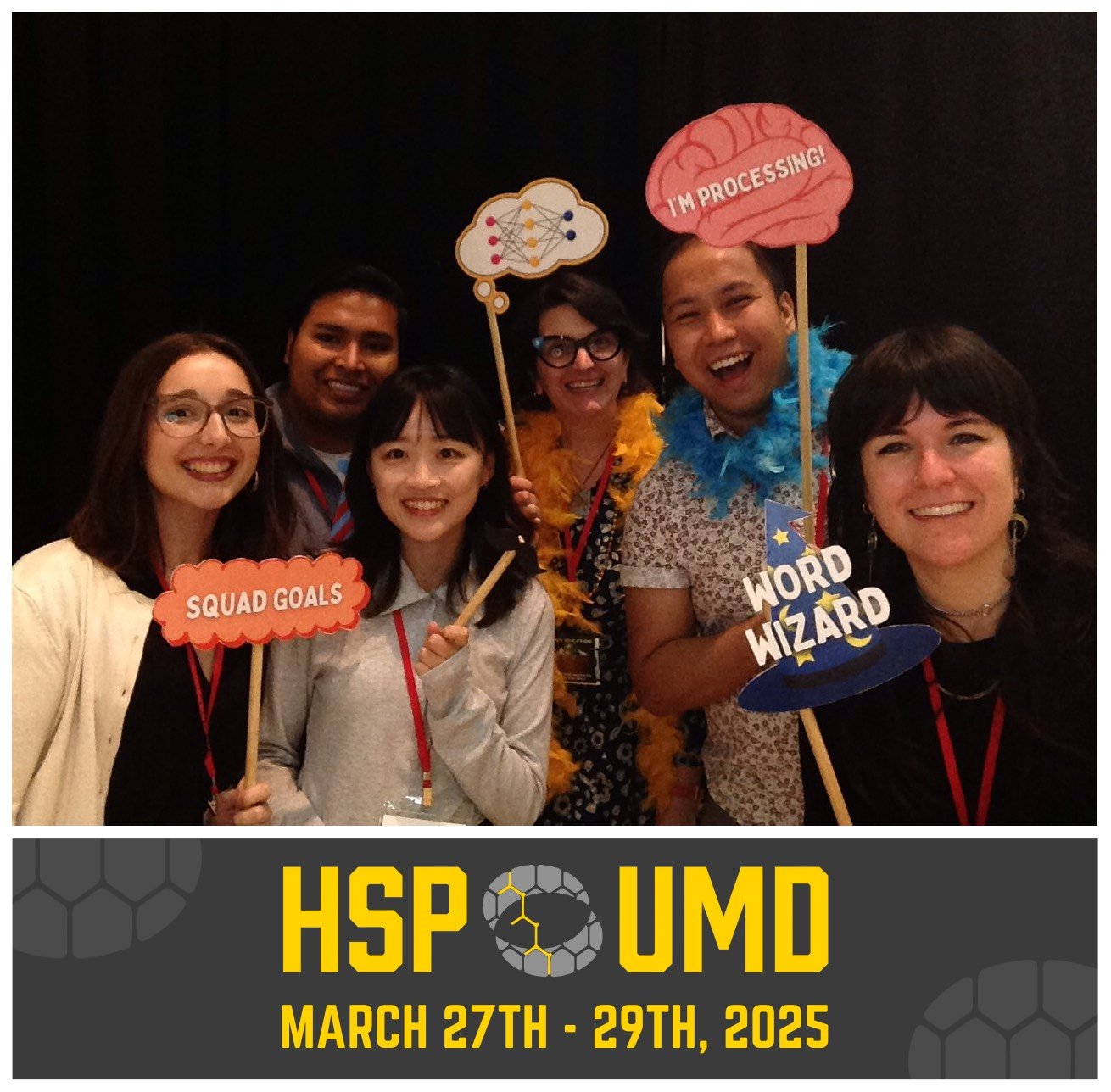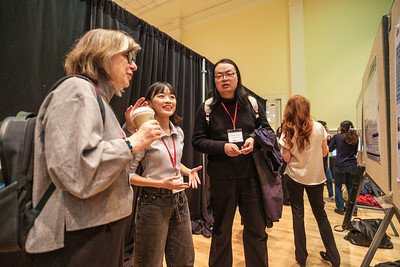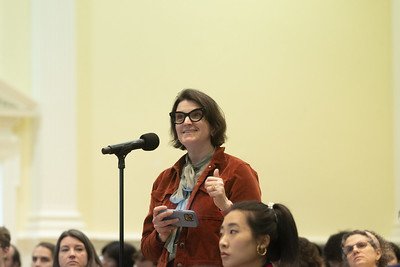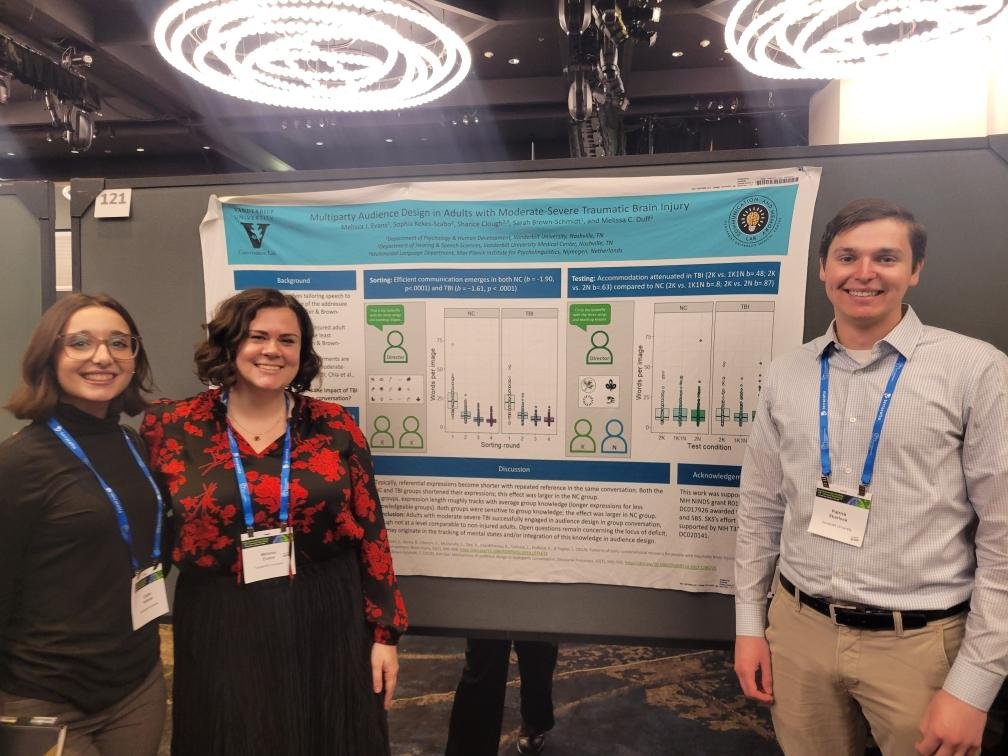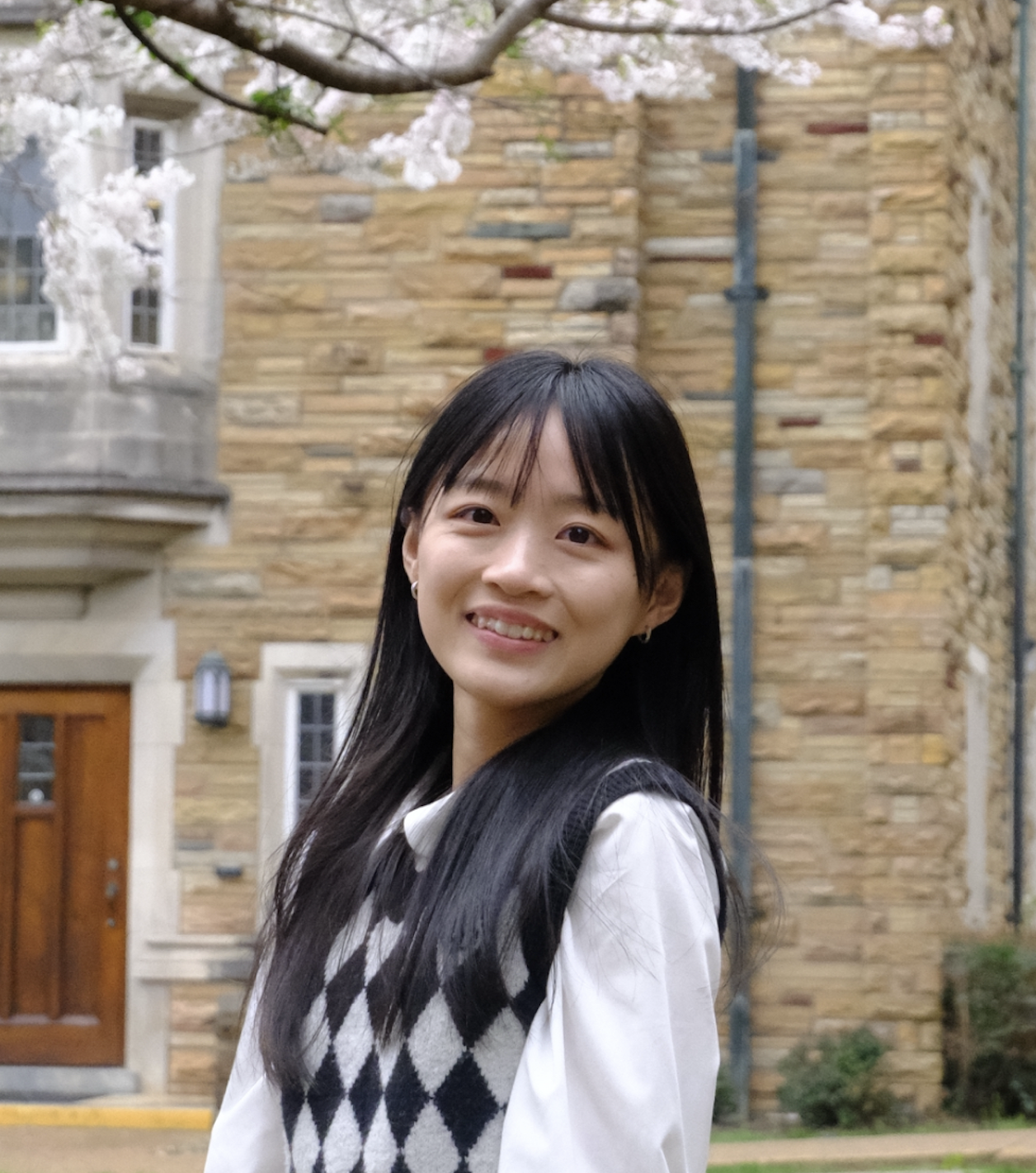Welcome to the Conversation Lab Page!

In our lab, we are currently working on various projects related to cognitive processes of language and conversation. To read more about our published studies, click here.
If you are interested in becoming a graduate student in the lab, please click here.
If you are interested in undergraduate research experience positions in the lab, click here and fill out the application form. Opportunities for independent research projects are also available if you have worked in my lab for at least 2 consecutive semesters, and you approach me well in advance.
Members from the Conversation Lab and the Communication and Language Lab at HSP!
Zoey Zhou sharing her poster at HSP
Sarah asking an interesting question at HSP 2025!
Caitlin Volante, Melissa Evans, and Patrick Sherlock at Psychonomics 2024

Patrick Sherlock and Zoey Zhou talking to students at Glendale Elementary School.

Melissa Evans and Sarah Brown-Schmidt explaining our poster at CELS 2022.

Melissa explains the poster to a visitor! :)

Bethany Gardner (left) and Evgeniia Diachek (right) at CUNY 2019 in Boulder, CO.

Alison Trude running an eye-tracking study

Rachel Ryskin and Zhenghan Qi at CUNY 2017
Meet Our Lab Members:

Dr. Sarah Brown-Schmidt (director)
In my professional life, I am an Associate Professor in the Department of Psychology & Human Development at Vanderbilt University. My research focuses on the mechanisms by which people produce and understand utterances during the most basic form of language use: interactive conversation. I am currently pursuing three questions in related lines of research: Common ground and perspective taking, memory and language, and message formulation. For more information on my research content, visit my Professional Page.
Natalie Anreoli (Lab Manager)
I'm excited to return to the lab as Lab Manager after successfully completing the Honors Program in Psychology and earning my bachelor’s degree in 2025! My research interests are what factors impact and correlate with conversational recall.
My current project involves how the use of recall type, which involves quoting vs. indirectly mentioning someone’s dialogue, correlates with memory of a conversation.
Caitlin Volante (PhD Student)
I am a third year PhD Student in Psychological Sciences at Vanderbilt University working with Dr. Sarah Brown-Schmidt. I received my B.S. in Neuroscience from Florida State University. While there, I worked with Dr. Michael Kaschak in the Learning, Memory, and Language Lab.
I am interested in how different linguistic features impact listener comprehension and speaker impressions, and how this might change between injured and non-injured populations.
Yu (Zoey) Zhou (PhD Student)
My name is Yu (Zoey) Zhou, the first year PhD student in the Conversation Lab. I’m interested in how real-time language processing interacts with cognitive mechanisms. My research focuses on how different language phenomena—such as disfluencies and temporary ambiguities—affect memory and comprehension.
Alumni:
Melissa Evans (Ph.D 2025, now at Exponent)
Zhixian Li (MA, 2025)
Patrick Sherlock (Research Associate, MIT)
Bethany Gardner (Ph.D. 2023)
Evgeniia Diachek (Ph.D 2023)
Anna McKay Wright (Ph.D. 2023)
Katie Lord (PhD Student, Clinical Psychology UC Irvine)
Jordan Zimmerman (PhD student, Clinical Psychology, Harvard University)
Craycraft (MA, 2018)
Rachel Ryskin (Ph.D. 2016, Assistant Professor, UC Merced)
Si On Yoon (Ph.D. 2016, Assistant Professor, University of Iowa)
Kate Sanders (MA, 2014)
Alison Trude (Ph.D. 2013, now at Amazon)
MATLAB code for running and analyzing experiments:
Most of our experiments are run using MATLAB along with the Psychophysics Toolbox (PTB-3), Brainard, 1997; Pelli, 1997. PTB-3 has what used to be known as the Eyelink toolbox built-in; this allows us to send commands to our eye-tracker from within MATLAB. I have designed some demo code that (1) runs a visual-world eye-tracking experiment, and (2) analyzes the data in Matlab. To get started, download the zip-file here, and follow the instructions in the README file. This demo is meant to provide some basic ideas about how to get started programming in Matlab, and will most certainly have to be edited to meet your needs (to get rid of bugs, improve efficiency, etc.). I welcome any comments or feedback you have. I make no guarantees about the accuracy of the code, and guarantee there’s probably a better way to program the experiments than we’ve done here.
We use EyeLink 1000 eye-trackers to monitor the eye movements of participants as they engage in dialog tasks. Our research focuses on the mechanisms that support language processing in everyday conversation. For a description of my research interests, please click on the research link.
Resources and Links for students:
APA undergraduate fellowships for research.
